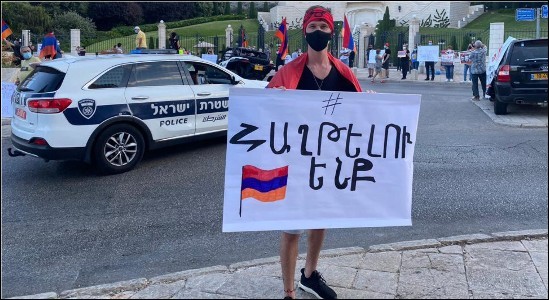Israel’s High Court of Justice rejected on Monday, October 13, a petition to ban arms sales to Azerbaijan. The court decided that the plea is “lacking evidence to justify a hearing on whether they have been used for war crimes against Armenia.” Human-rights lawyer Eitay Mack and activist Elie Joseph, who has been on a hunger strike over the issue, filed the petition.

Ethic Armenian citizens of Israel demonstrate in Haifa, October 2, 2020, calling for a cease-fire in the fighting in Nagorno-Karabakh and an end Israel’s arms sales to Azerbaijan. The placard implores “Don’t abandon Armenia.” (Photo: Serg Bidoyan)
Joseph presented before the court news reports that 60% of Azerbaijan’s arms come from Israel and evidence of a potential airlift of weapons to Azerbaijan days before its current conflict with Armenia erupted. He also presented news reports and a report by Amnesty International with evidence that Azerbaijan is using Israeli drones to kill Armenians.
However, almost none of what Joseph presented proves that Israeli weapons have been used against Armenians for war crimes, presiding Justice Yosef Elron said. “At most, it proves that Israeli weapons have been sold to Azerbaijan, which might mean being held in storage or in reserve for defensive purposes only,” he said. The court’s decision does not preclude a new petition if more substantial evidence of war crimes is presented.
Despite the High Court’s decision, Atty. Mack appealed directly to the government to cease any sales to Azerbaijan on moral grounds based on more general evidence from Azerbaijani officials. Azerbaijan has published footage of Israeli models of unmanned aerial vehicles, including offensive and kamikaze UAVs, he said.
In 2015, Azerbaijani soldiers marched in a parade carrying Israeli-made Tavor rifles, Mack said. In September 2016, Azerbaijan President Ilham Aliyev visited a government-owned factory that produces Israeli models of kamikaze drones, he said.
In a meeting with Prime Minister Benjamin Netanyahu, Aliyev said Israel had agreed to sell Azerbaijan defense equipment worth nearly $5 billion, Mack told the justices. In addition, the Azerbaijani Defense Ministry has released a video showing what could possibly be an Israeli UAV (unmanned aerial vehicle, i.e., drone) flying for a split second past a Turkish attack UAV, Mack said.
According to Mack, “Israel, meanwhile, maintains strategic relations with Azerbaijan, both as part of its cold war with Iran and because it purchases a significant portion of its oil from Azerbaijan. Relations between the two countries have been very discreet for years, but have recently surfaced openly, with former Defense Minister Moshe Ya’alon and Prime Minister Benjamin Netanyahu visiting Azerbaijan in 2014 and 2016, respectively. Mack said that today, Israel is one of Azerbaijan’s leading suppliers of weapons. “The background of Israeli arms sales to Azerbaijan relates to complex geopolitics relating to Iran, which it borders, and Israel’s oil needs,” Mack said.


